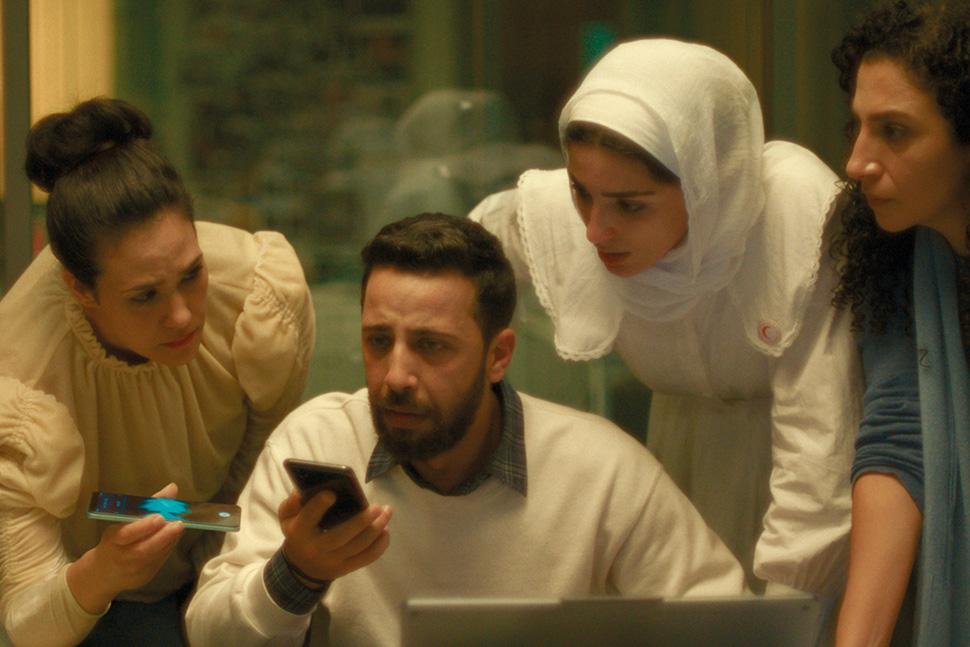The Voice of Hind Rajab
.
VERDICT: A tremendously moving reenactment of a real tragedy that took place in Gaza, Kaouther Ben Hania’s ‘The Voice of Hind Rajab’ masterfully integrates fiction and reality in a grief-stricken lament for a child in mortal danger.
Of all the shocking images that have come out of Gaza after the Israeli invasion, the ones that remain seared on the memory are those of children who have lost their lives, sometimes as collateral damage, at other times as the deliberate target of bullets and bombs. There is the news footage of a little boy kissing the hand of a volunteer distributing food, minutes before he is shot to death by an Israeli soldier; there is the story of Hassan and other children separated from their families in the compilation of short docs called From Ground Zero, shot in Gaza by eyewitnesses. The Voice of Hind Rajab occupies a special place among children-at-war films, thanks to the technical wizardry of Tunisian director Kaouther ben Hania and her ability to create empathy, not just for a six-year-old girl trapped in a car under fire, but for the entire staff of a Red Crescent Emergency Center coordinating the rescue from the West Bank.
The film, which bowed in competition at the Venice Film Festival, furthers the director’s exploration of mixing fictional drama with reality to obtain the greatest emotional and dramatic effect. Her award-winning 2023 film Four Daughters broke exciting new ground in merging documentary and fiction to shine light on family dynamics and the political radicalization of two sisters, mixing the real protagonists with actors.
The new film goes even further, creating 90 solid minutes of incredible tension around the real voice of six-year-old Hind Rajab Hamada, recorded during an extended phone call with the Palestinian Red Crescent Society in Ramallah, West Bank. This authentic call is visually represented as a long bouncing line across the screen, with which the helpless staff (all actors) interact in a heart-breaking conversation.
The date is Jan. 29, 2024 and Hind is traveling in a car with her aunt and uncle and their four children, who are fleeing from their home in Gaza City. They are near a gas station when an Israeli tank appears and opens fire on them, riddling the car with bullets and killing everyone except Hind and her teenage cousin Layan, who later also dies.
Mahdi (Motaz Malhees), who is manning the phones in Ramallah, takes Layan’s call begging for help. Gunshots can be heard in the background. He is instantly involved in the drama taking place in northern Gaza – in fact, as a hair-trigger hothead prone to grabbing other people’s phones and insulting their official contacts, he’s far too emotional to be of much help. Rana (Saja Kilani) takes over with a more maternal approach, even reciting prayers with the little girl, but she can’t forget Hind is trapped in a car with the bloody bodies of her family.
While Rana talks, Mahdi hysterically vents his frustrations on Omar (Amer Hlehel), the cool head who has to coordinate a safe passage for an ambulance and its rescue team of paramedics to save the little girl. The bureaucracy he is facing is formidable. While their supervisor Nisreem (Clara Khoury) tries to calm down their shouting matches, Rana slowly collapses from the emotional strain of talking to the frightened little girl, whose fate looks darker with each minute that passes. She screams that a tank is approaching the car head-on…
Shooting in a single, cramped location – the communicating rooms of the emergency center – to rack up the tension, Ben Hania develops the dialogue along essential lines and concentrates the camera on close-ups of the actors’ faces. Sometimes the staff’s emotional energy is too raw to accept, leaving the audience to defend itself against the crushing weight of their despair. Hind is just one human life, but she stands in for the entire genocide that is taking place in front of our eyes.
Director, screenplay: Kaouther Ben Hania
Cast: Saja Kilani, Motaz Malhees, Clara Khoury, Amer Hlehel
Producers: Nadim Cheikhrouha, James Wilson, Odessa Rae
Cinematography: Juan Sarmiento G.
Editing: Qutaiba Barhamji, Maxime Mathis, Kaouther Ben Hania
Production design: Bassem Marzouk
Costume design: Khadija Zeggai
Music: Amine Bouhafa
Sound: Amal Attia, Elias Boughedir, Gwennolé LeBorgne, Marion Papinot, Lars Ginzel
Production companies: Mime Films & Tanit Films, JW Films, RaeFilm Studios
World Sales: The Party Film Sales
Venue: Venice Film Festival (Competition)
In Arabic
90 minutes

